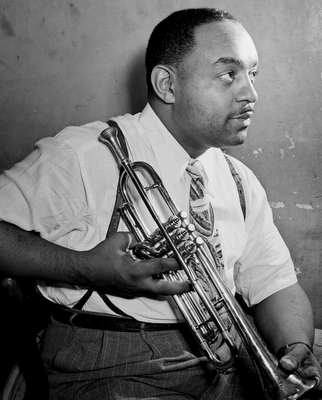Bennett Lester Carter, born August 8, 1907, died July 12, 2003. He was an American jazz trumpeter, composer and arranger. From the 1930s through the 1990s, he was a prominent figure in jazz and was often referred to as King by jazz musicians. Carter grew up in Harlem, right around the corner of Bubber Miley, Duke Ellington’s famous trumpeter. Carter was inspired to buy a trumpet by Miley. But when he realized he couldn’t play like Miley, he traded in the trumpet for a saxophone. Carter started playing professionally at the age of 15. Carter began recording professionally at the age of 15. He formed his first major band in 1928. Fletcher Henderson was his first recording partner in 1930, and he then joined McKinney’s Cotton Pickers for a short time before forming his own band in 1932. Most jazz scholars consider the few recordings that his band recorded between 1933 and 1934 to be landmarks in early swing arrangement. These were complex and sophisticated arrangements that were later performed by other bands (“Blue Lou”) are a prime example. During these years, he also arranged for Henderson u0026 Duke Ellington and wrote two hits: “Blues in My Heart” and “When Lights Are Low”. He and Johnny Hodges were the most prominent alto players in the world by the 1930s. Carter was also a prominent trumpet soloist after he rediscovered the instrument. In the 1930s, he recorded extensively on trumpet. In 1933, Carter participated in a remarkable series of sessions featuring Spike Hughes, a British band leader who arrived in New York to arrange a series recording with the best Black musicians. These 14 sides were not available in England at the time. However, they are now on CD and worth looking for. (The musicians were mostly made up of members from Carter’s band and Luis Russell’s. He moved to Europe in 1935 and became the staff arranger of the British Broadcasting Corporation’s dance orchestra. He also made many records. After returning to the United States in 1938, he led a large band and sextet. He then moved to Los Angeles in 1943 to work for film studios. Carter performed and continued to write well into his 90s. He orchestrated for Ray Charles, Ella Fitzgerald and Sarah Vaughan. He was best known for “Cow Cow Boogie”, which he co-wrote along with Gene DePaul and Don Raye. This song was also a hit with Ella Mae Morse back in 1942. Carter was one the first black men to create music for movies in the 1940s and 1950s. When Quincy Jones started writing for television and film in the 1960s, Carter was a mentor and inspiration. Carter was also a pioneer in a different area in the 1940s with his successful legal battles to get housing in once-exclusive Los Angeles neighborhoods. In The Snows of Kilimanjaro (1952), he is credited as a saxophonist. Carter’s ability to compose saxophone solos, which are music sections that play together in the same way as a solo, was something that made him admired. Carter was part of the National Endowment for the Arts’ music advisory panel. Carter was also a member of Black Film Makers’ Hall of Fame. He received in 1980 the Golden Score award from the American Society of Music Arrangers. Carter was also a Kennedy Center Honoree and received honorary doctorates at Princeton, Harvard and Rutgers in 1996. At 95 years old, he died at Cedars-Sinai Medical Center in Los Angeles from what is believed to be bronchitis. Text contributed by users is available under Creative Commons By–SA License. It may also be available under GNU FDL.
